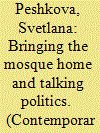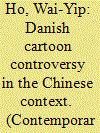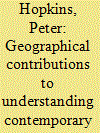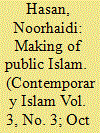| Srl | Item |
| 1 |
ID:
092006


|
|
|
|
|
| Publication |
2009.
|
| Summary/Abstract |
In this article I argue that domestic space has to theorized as an important center of religious practice and socio-political activism. Born-again and devout Muslim women in the Ferghana Valley (Uzbekistan) use domestic space as an important sacred place for religious abservance and socialization equal to the mosques. This sacred place has a special meaning for born-again and devout Muslim as it carries a promise of personal and social change. In the context of religious and political persecution by the Uzbek state, domestic space is experienced as a politically safe place and as a critically important site of socio-political criticism and activism, as some intimate in-house discussions about religious, political, and social oppression take a form of public protest on the streets.
|
|
|
|
|
|
|
|
|
|
|
|
|
|
|
|
| 2 |
ID:
092007


|
|
|
|
|
| Publication |
2009.
|
| Summary/Abstract |
Placed within the wider Chinese context of Muslims' reticent response to the publication of twelve cartoons by Danish newspaper Jyllands-Posten, this paper attempts to understand the transnational impact of global Muslim protests against the Danish Cartoons, which resulted in the re-emergence of Hong Kong Muslims in the public sphere. By discussing the genesis of the public appearance of Hong Kong Muslims in response to the Danish Cartoon affair, this paper argues that the controversy has resulted in a heightened sense of Islam in the Chinese public sphere. Framing the emerging Islamic voices in a context where the Chinese government has a coherent rationale towards religious policy in its domestic politics, and its unprecedented political experiement of One country, two systems, this article points out the contrasting public visibility and global connection of Muslims in Hong Kong and the Mainland.
|
|
|
|
|
|
|
|
|
|
|
|
|
|
|
|
| 3 |
ID:
092004


|
|
|
|
|
| Publication |
2009.
|
| Summary/Abstract |
In recent years, geographers have been giving increasing attention to religion- and Islam in particular-yet such work is rarely referred to within the broader social science literature about Islam and Muslims. This paper seeks to promote interdisciplinary dialogue, discussion and debate by highlighting the contributions that human geographers are making to understanding of contemporary Islam. In particular, I draw upon research within urban, social, cultural and feminist geographies to review current trends within geographical scholarship about Muslims individuals and communities. I then use this paper to suggest ways in which interdisciplinary research-in collaboration with human geographers-might seek to advance contemporary understanding of the social and spatial experences of Muslim families and communities.
|
|
|
|
|
|
|
|
|
|
|
|
|
|
|
|
| 4 |
ID:
092005


|
|
|
|
|
| Publication |
2009.
|
| Summary/Abstract |
Over the last three decades, Islam has demonstrated its vitality as a system of symbolic and collective identity that informs the social and political dynamics of Indonesian society. It was increasingly served as the most important frame of reference for many Indonesians to reflect upon the socio-political and cultural system they imagined capable of bringing about justice and attaining veritable development. Keeping pace with the growing influence of Islam among the emerging Indonesian Muslim middle class, it has even gradually emerged as a symbol of elitism, associated with the road to success.Its strength lies in the fact that it has developed into some sort of network that enables large numbers of people from different social background to share and make contacts, both real and virtual.Though this network, the Islamic revival messages have resonated loudly, influencing multiple social and political fields.The network, in turn, provides credible paths for upward mobility and also a market for commercial products.
|
|
|
|
|
|
|
|
|
|
|
|
|
|
|
|